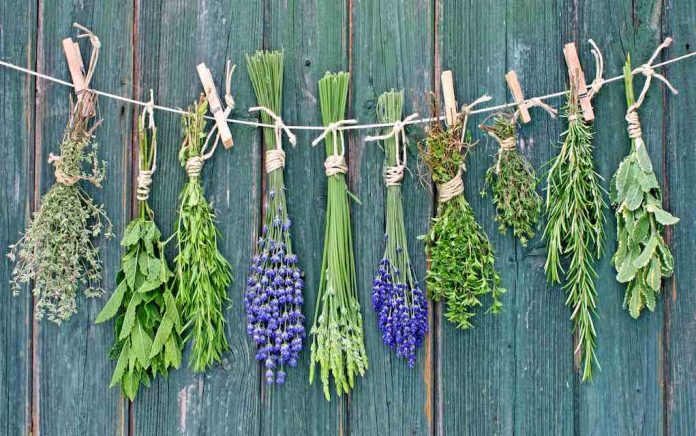
Whether you’ve never taken herbs in your life, you’re an occasional user, or you consider yourself to be quite knowledgeable about all things herbal, there’s always something you can learn. The following herbal Q&A is for everyone who has a question—or questions—regarding the who, what, where, how, and why of herbs.
To get the answers to our questions, we consulted our partners at Herb Pharm.
How do you describe herbalism to those new to it?
Herbalism can mean many different things and be viewed from a purely amateur level to professional. Generally, herbalism means working with plants that help support wellness and health for yourself or others.
Herbalism could mean saving the seeds of certain herbs and sharing them with others or making herbal preparations from them. Some individuals practice herbalism by teaching it to others through writing and/or lectures, while others may operate a clinical practice (clinical herbalists) where people come to learn about and get herbal products. The overall thread among these possibilities is connecting people with plants to support their health and wellness.
How do you recommend getting started with herbs for newbies?
Although herbs are available in many forms, there are three ways individuals who are new to herbs often find it most comfortable to get started. One is to use liquid herbal extracts. You can simply add the recommended serving size of an extract to water or a beverage—no muss, no fuss! Be sure to follow the directions provided on the label. Teas are another common and easy way to get started. Simply follow the directions on the package and enjoy!
A third way is to incorporate herbs into your daily menu. There are many herbs that can be added easily to every meal, and in fact, you may be doing so already and not realize it. Common culinary herbs such as turmeric, basil, rosemary, thyme, sage, oregano, mint, lemongrass, sweet marjoram, and cilantro have a history of use in herbalism. Use herbs in your soups, salads, smoothies, sauces, and beverages.
What’s the difference between vitamins and herbs?
Before we mention the difference, one thing vitamins and herbs have in common is an ability to help support the body. Both vitamins and herbs play important roles in our overall health.
The difference between vitamins and herbs is that vitamins are nutrients, and the majority of them cannot be synthesized or made by the body. We get our vitamins primarily from foods and/or from supplements, the latter of which may be naturally sourced from dehydrated whole foods or formulated.
Herbs are plants and not nutrients, although a few do originate from lichens, seaweeds and mushrooms. Many herbs also contain vitamins and other nutrients, but the amount of herbal material consumed is often small and so these may not be nutritionally relevant. Of special interest are the secondary or non-nutrient Phyto (plant) compounds.
What’s the difference between an herbalist and a naturopath?
The biggest difference is the scope of focus, although there is certainly an overlap between them. Training for herbalists naturally focuses extensively on the herbs themselves, their effects on the body, and how to make herbal preparations. Naturopaths have a broader education that focuses on more clinical applications such as physical examination skills, laboratory testing, physical and behavioral medicine, and diagnostics. Herbalists and naturopaths can work together and complement each other.
What are a few great resources for people who want to know more about herbs and herbalism?
The Internet has a vast amount of information, but some of it is conflicting. It is best to look for reputable sources, which includes some excellent books. One is by herbalist Rosemary Gladstar called Rosemary Gladstar’s Medicinal Herbs: A Beginner’s Guide: 33 Healing Herbs to Know, Grow, and Use. She also has several other great books that provide a wealth of information. Another good source is the website HerbRally, which offers articles, podcasts, monographs, and information on herbal schools. A reputable organization to investigate is the American Herbalists Guild and another great resource is Herb Pharm.
Here are a few more questions people often ask about herbs.
How do you take herbs?
Herbs are available in a number of different forms. The form you choose to take will depend on why you are taking it and your personal preferences. The first recommendation is to take the herb according to the directions provided by the producer. If you have any questions about those instructions, you should consult an herbalist or another knowledgeable healthcare provider about how to use the herb.
Herbs can be used in foods, such as adding fresh basil or thyme to a salad or stirring rosemary or oregano into sauces. They also can be used as liquid extracts, such as teas, tinctures, or glycerites, and can be taken as capsules or powders. For topical use, herbal salves, creams, lotions, and gels are available. Essential oils are yet another way to reap benefits from herbs.
What is the best time to take herbs?
This depends on why you are taking the herb. If you are taking a supplement to support energy and vitality, for example, you will want to take it in the morning or early afternoon, but not later in the day or evening because it may affect your ability to sleep. Bitter digestive herbs are typically taken 10 to 15 minutes before eating so they can prepare your digestive tract. Calming herbs such as chamomile and kava can be taken at any time, but some may be better suited to take before retiring.
Unless there are specific instructions on how to take an herb, generally they are best taken on an empty stomach, about 30 minutes before a meal or two hours after eating to maximize absorption. Taking herbs twice or more times a day (as instructed) helps to keep them in your system longer.
How long does it take for herbs to work?
This depends on the herb, the person, and why the herb is being used. Response time of herbs can range from as little as a few minutes to several months. Liquid herbal extracts are well absorbed and begin to work quickly. The important thing to remember is that noticeable effects can vary significantly.
For example, herbs such as kava, which supports the nervous system,* may produce noticeable effects within 10 to 20 minutes of using the supplement. Bitter digestive herbs also can affect the digestive system in about the same amount of time. That’s why they should be taken about 15 minutes before eating.
Other herbs, however, may not provide noticeable effects for one to three days or longer. Tonic herbs, such as mushrooms, maca, or ashwagandha, act more slowly and typically take from 1 to 3 months to produce noticeable results.
Can I take more than one herb at a time?
Many herbal supplements are compounded with more than one herb, and they are formulated to support specific structures or functions of the body. Typically, creating compounds with multiple herbs allows a more varied response. Generally, it is recommended you take no more than five single herbs together or three compounds. This allows you to focus your herb use on specific areas that concern you.
Should I talk to my doctor before taking herbs?
It is recommended you speak with your healthcare provider before starting any herbal regimen if you are taking any medications, over-the-counter or prescription, or if you have any medical condition. Depending on the herb, some can interact with medications. You may want to speak with an herbalist or naturopath as well.
Is one herbal form better than another?
The best herbal form for you is the one you are comfortable taking. That may mean a tea, tincture, capsule, powder, or spray. Liquid extracts are a popular form because they are convenient and they are readily absorbed. Extraction separates the phytochemicals in the herb from the structure of the plant. This allows the phytochemicals to be thoroughly and easily absorbed by the body.
Some herbs have undesirable tastes or smells, and so a capsule can be a better choice in such cases. For many herbs, however, the taste and smell and even the color are important factors in the herb-taking experience. Being able to smell, taste, and enjoy the appearance of an herb enhances our connection with the plant and Nature. This feature is often overlooked and it is one that can be enjoyed when taking herbs.
Bottom line
Herbs are a great way to complement not only your menu but also your health and wellness. Welcome the abundance of herbal possibilities into your lifestyle and enjoy what they can offer you and your family.
*These statements have not been evaluated by the FDA. These products are not intended to diagnose, treat, cure or prevent any disease.
Read this next:
Herbs to Support Health – How to Take Herbs











